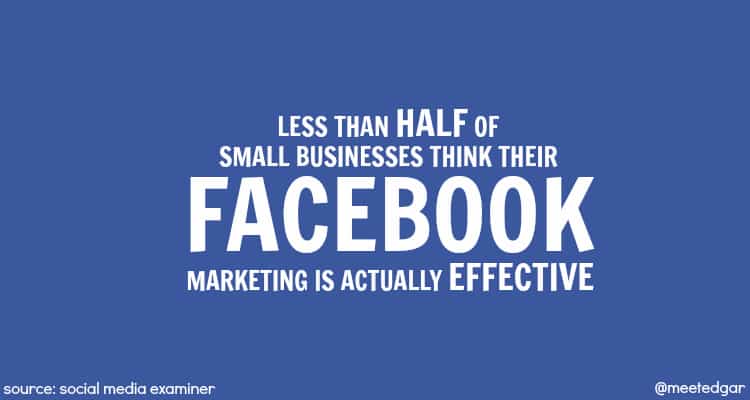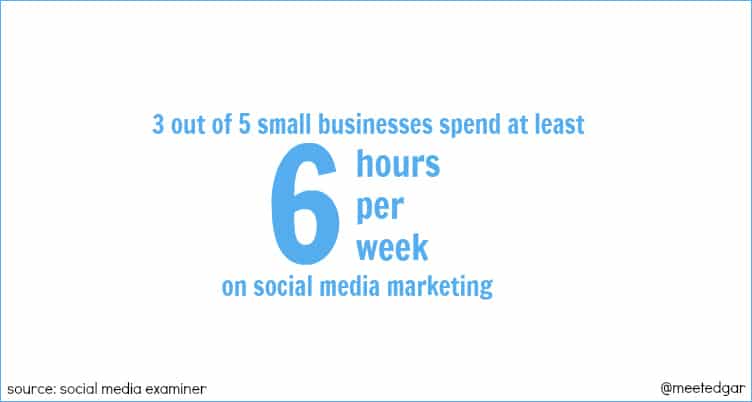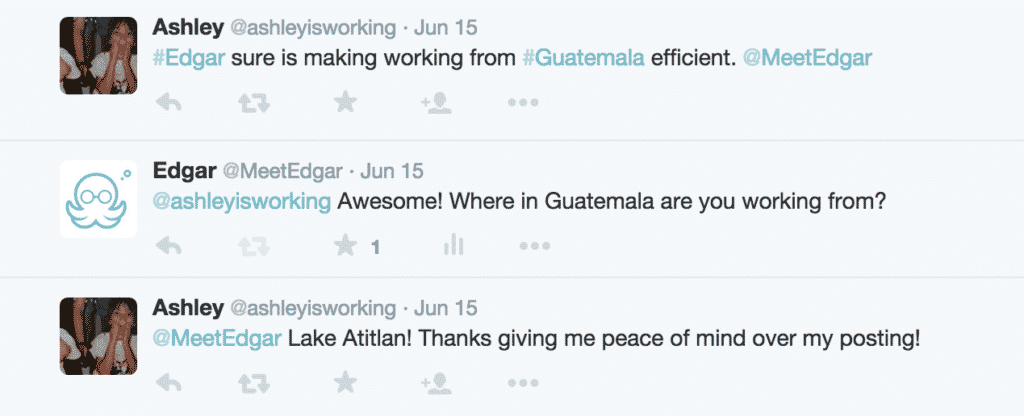Odds are, you’re among the 93% of small business owners and marketers who use Facebook for their marketing.
Are you also in the majority that either doesn’t know if it’s actually working, or even thinks that it isn’t?
[easy-tweet tweet=”According to a recent survey published by Social Media Examiner, more than half of small businesses either think that Facebook marketing doesn’t work, or they don’t know if it works”]. Only a paltry 45% of marketers actually characterize their efforts as effective.
Kind of hard to believe, right? Despite the fact that virtually everyone uses Facebook for their small business marketing, less than half think it actually works!
(Doesn’t exactly inspire a lot of confidence.)
That in mind, it’s pretty likely that at SOME point – maybe even right now – you’ve been one of the people asking yourself one big question:
Does Facebook marketing even work?
It’s an easy thing to wonder about. After all, it’s no secret that organic reach can be almost embarrassingly low. (It averaged 2.6% in March, and 4.11% in April. It’s not just you.)
But what does successful Facebook marketing even look like? Is there one specific thing you can look at on your page and say, “Yes! I’m totally nailing this Facebook stuff!”
Is it…
- High reach?
- More likes and comments?
- Lots of clickthroughs?
- Shares for that great selfie you just took?
This is why more than 1/3 of all people in your position have NO idea whether or not their Facebook marketing even works. It’s like firing at a moving target and not knowing how many points anything is worth. You don’t know if you’re winning or losing, but you keep on playing – and that feels frustrating. It feels like a waste of time.
So what do you do?
How to make Facebook marketing feel like it’s actually making a positive difference
The good news is, there’s no universal benchmark for what defines successful Facebook marketing.
The bad news is, there’s no universal benchmark for what defines successful Facebook marketing.
Because while there are averages you can compare yourself to – like those reach figures above – there are no make-or-break goals that every business should necessarily be hitting. That means it’s up to you to determine just what success looks like.
How do you do that?
- Know that some data is more valuable than OTHER data
One of the reasons that Facebook reach can be so frustrating is that we think it’s more valuable than it really is. Just like Jon Loomer explains in this must-read blog post, reach is a deceptive metric, and one that can distract you from focusing on much more useful information. You can have strong engagement rates even with relatively low reach – in fact, that can be a lot more valuable than having it the other way around. There’s nothing wrong with wanting a larger swath of your audience to see your posts, but don’t fall into the trap of thinking that lower reach is automatically the kiss of death, or that higher reach means you’re killing it.
- Learn how to play Calvinball
In the game of Calvinball, you make up the rules as you go along – and that means your luck can change at the drop of a hat.

Facebook is the same way – their constantly-shifting algorithms mean that keeping up with the rules is a never-ending task. Your organic reach is affected by factors like:
- Page size/number of fans
- Engagement rate
- Types of content on your page
- Types of content on your website
- Advertising content
If improving your reach is an immediate goal, learn what Facebook is looking for – and NOT looking for. The rules change, but that doesn’t mean you always have to guess at what they are.
- Spend your time wisely
Feel like you’re spending a lot of time on your social media marketing?
(Like, a LOT?)
You’re not alone. In fact, most small businesses spend at LEAST 6 hours a week on their social media marketing – and that’s a lot of time for something that they’re not really sure is even working.
Spend the time you have on tasks you know make a positive impact – and find ways to simplify the rest.
Our team, for example, could spend hours a week uploading and scheduling Facebook posts, or manually shuffling a queue to make sure we post the right types of updates at the right time. The time we’d spend on that task, however, would take away from the time we have for other tasks – ones that have a more predictable certainty of making a positive difference. We use Edgar to manage what types of updates get posted at certain times, and to automatically fill and refill our queue, effectively giving ourselves more time to do things like interact live with our followers on Facebook and other networks.
Using Edgar is how we reduce the time it takes to do something mundane (but necessary), so we have more time for the high-impact tasks that can’t be automated, and that make a big difference when it comes to building relationships with fans and users.
Spend less time on the tasks that frustrate you, so you can spend MORE time on the things that don’t. Tasks are frustrating because they feel like a waste of time – and they’re satisfying because they feel valuable. There’s a reason for that, so don’t feel guilty for tipping the scales in favor of the things that feel right!
And remember…
What you define as successful Facebook marketing can change over time – and it can be a LOT different from someone else’s definition of success.
You might find that Facebook is most useful for sending traffic to your blog.
Or getting new signups for your newsletter.
Or making sales during a promotional period.
You might find that Facebook is most useful just for building brand recognition, and turning awareness into preference – things that aren’t as easy to interpret from raw data as other figures, but are important nonetheless.
Failing to meet one goal doesn’t necessarily mean that Facebook isn’t an effective marketing tool for your business – it might just mean that you have the wrong goals. Focus on where things are going right, even if it isn’t what you intended when you started. That could be all it takes for you to join that minority of marketers who realize just how effective Facebook can be!






4 Comments
This is a good post but has two faulty assumptions: not EVERYONE is on Facebook and not all companies use FB for their marketing.
The problem I have with companies and their FB marketing is when they use FB as a wall-garden info source. While FB pages are public, groups are not. I’ve seen organizations state you must join their FB group to get information that really should be on the website.
Personally, I think companies would improve their marketing considerably if they’d stopped thinking EVERYONE is on FB.
That’s true – although Facebook is the most popular social network, it’s never safe to assume that a single social network will reach all of your audience. Knowing where to reach your audience, and being picky about where you post, will let you be more effective without taking up more time!
You’re definitely right that not ALL businesses use Facebook for their marketing – about 7% of these respondents hadn’t yet started at the time of the survey! In any case, relying solely on an external network that’s out of your control and can change the rules at any time – like Facebook – is a risky move no matter HOW many people are on it. Facebook is a valuable part of a marketing strategy, but you’re right that relying on it too heavily can lay the groundwork for stressful situations in the future!
Facebook is the 800 pound gorilla for paid local business advertising. All digital marketing efforts being equal, Facebook and free local classified ads on Craigslist / Kijiji are the only thing that matter for a local business. This is not the case for regional, national and global brands (I created and managed each type of these brands, so I am commenting from years of experience). If you had $300 to spend per month ($10/day) … you can reach more engaged people on Facebook (65-80% women, mind you) than any other platform for the same amount of money. The moment your budget expands to over $1-$1.5k per month, you should explore other marketing venues (e.g. Adwords, email etc.) because you can saturate a local market on Facebook with that much spend. Digital marketing is a beast (let alone, all-up marketing), so strategies must be designed to best fit the target market, product/service, and goals. In fact, a digital marketing strategy that works well for a small local business can easily be bad for a similarly large local business in the same city. As for the “risky” comment below, real “risk” only comes into play when you build on or integrate deeply into a social media platforms’ API (e.g. Facebook games, components, widgets, etc.). As for a marketing strategy, there is virtually no risk that cannot be mediated quickly and easily wrt Facebook advertising.